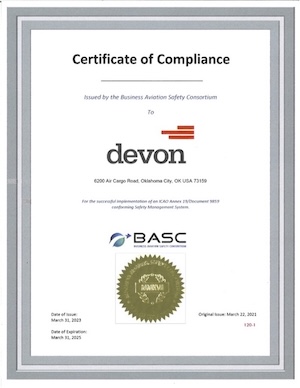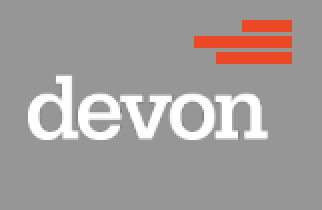Executive Summary:
Devon Energy’s Part 91 flight department successfully launched an Aviation Safety Action Program (ASAP) in early 2024, significantly advancing its safety culture and contributing to the company’s overall safety management system (SMS). The department's collaboration with Polaris Aero, its local FAA Flight Standards District Office (FSDO), and the seamless integration of VOCUS SMS software has facilitated a smooth and efficient rollout. The program has exceeded expectations, resulting in increased safety reporting and actionable insights, enhancing the safety of both flight and maintenance operations.

Background:
Devon Energy operates as a Part 91 Operation. As part of its commitment to enhancing safety, the company had already implemented a robust Safety Management System (SMS) using VOCUS. In January 2024, Parker Ferguson, Devon’s Safety Officer, and the department Management Team recognized the opportunity to further strengthen their safety efforts by introducing an ASAP program.
The Decision to Launch an ASAP Program:
In February 2024, Ferguson reached out to Polaris Aero’s Vice President of Safety Services, Kellie Roby, to learn more about the ASAP program. Polaris Aero, known for its expertise in ASAP implementation and Safety Services, provided immediate and comprehensive support. By March 2024, Devon met with their local FSDO, who was highly receptive to the idea of a Part 91 operator establishing an ASAP program.
The FSDO played a crucial role in facilitating the program, ensuring that the implementation process aligned with Devon’s operational needs without imposing unnecessary procedural changes. This collaborative relationship helped Devon move forward with confidence.
By June 4th, 2024, Devon Energy had successfully launched its ASAP program for flight crews and an MSAP (Maintenance Safety Action Program) for its maintenance team. According to Ferguson, “Reaching out to Polaris was very helpful. They knew exactly what to do, had ASAP manuals ready for us to adopt and reuse, and made it quick and easy. It saved us a lot of time.”
Implementation Process:
1. Partnership with Polaris Aero: Polaris Aero’s support proved invaluable in the early stages of the program. Their team assisted in developing the necessary manuals and materials, helping streamline the process of setting up Devon’s ASAP and MSAP programs. Ferguson also appreciated how easy it was to integrate the program into Devon's existing VOCUS SMS system, which helped ensure consistency and efficiency in safety reporting.
2. Collaboration with the FSDO: Devon’s local FSDO was particularly helpful in ensuring that the program was tailored to Devon’s specific operational needs. The FSDO recognized the voluntary nature of the program and was eager to support the department’s safety journey. This collaboration created a positive atmosphere, which allowed the program to move forward without bureaucratic hurdles.
3. Execution of the First ERC (Event Review Committee) Meeting: With initial guidance from Polaris Aero, Devon held its first ERC meeting, which involved reviewing safety reports and determining corrective actions. Although Polaris Aero’s team initially assisted, Devon was able to independently conduct the first ERC meeting with the FSDO, thanks to the well-organized information in their VOCUS SMS. This independent execution demonstrated Devon’s growing capacity to manage its ASAP program effectively on its own.
4. Real-time Safety Insights: VOCUS SMS Insights provide Devon with a real-time, comprehensive view of safety trends by aggregating data from SMS reports, ASAP reports, and FOQA reports. This composite view not only saved managers hours of manual data processing but also enabled quicker decision-making. Ferguson appreciated how VOCUS automatically produced the necessary reports for the ERC meetings.
5. Industry-wide Contribution: Devon also enrolled in the FAA’s ASIAS program, which allows the anonymized and aggregated data from their ASAP program to be shared with the broader aviation community. VOCUS automatically pushes ASAP data to the ASIAS program, further saving the operator from the manual chore. This participation underscores Devon’s commitment to improving safety industry-wide, not just within their operation.
Key Takeaways:
• Collaboration and External Support: Devon Energy’s partnership with Polaris Aero was instrumental in launching a successful ASAP program. The company benefited from Polaris's expertise, pre-existing materials, and hands-on support during the early stages of implementation.
• Fostering a Positive Relationship with the FSDO: The FSDO’s open-minded and collaborative approach allowed Devon to tailor the program to their needs, avoiding unnecessary procedural changes and ensuring that the program aligned with their operational requirements.
• Efficient Use of Technology: The seamless integration of the ASAP program with VOCUS SMS allowed Devon to manage multiple safety programs through a single platform, saving time and effort. Real-time insights enabled faster decision-making and better safety trend tracking.
• Exceeding Expectations: The ASAP program exceeded initial expectations in terms of participation and safety reporting, underscoring the importance of fostering a culture of safety within the organization.
Conclusion:
The successful launch of Devon Energy’s ASAP program in 2024 highlights the effectiveness of a collaborative, streamlined approach to safety management. By leveraging Polaris Aero’s expertise, maintaining a strong relationship with the local FSDO, and utilizing the VOCUS SMS platform, Devon Energy has created a safety culture that not only benefits its flight and maintenance teams but also contributes to the broader aviation community through industry-wide data sharing. The program’s early success, including increased reporting and improved safety insights, demonstrates the value of investing in proactive safety initiatives that promote continuous improvement and a shared commitment to aviation safety.

